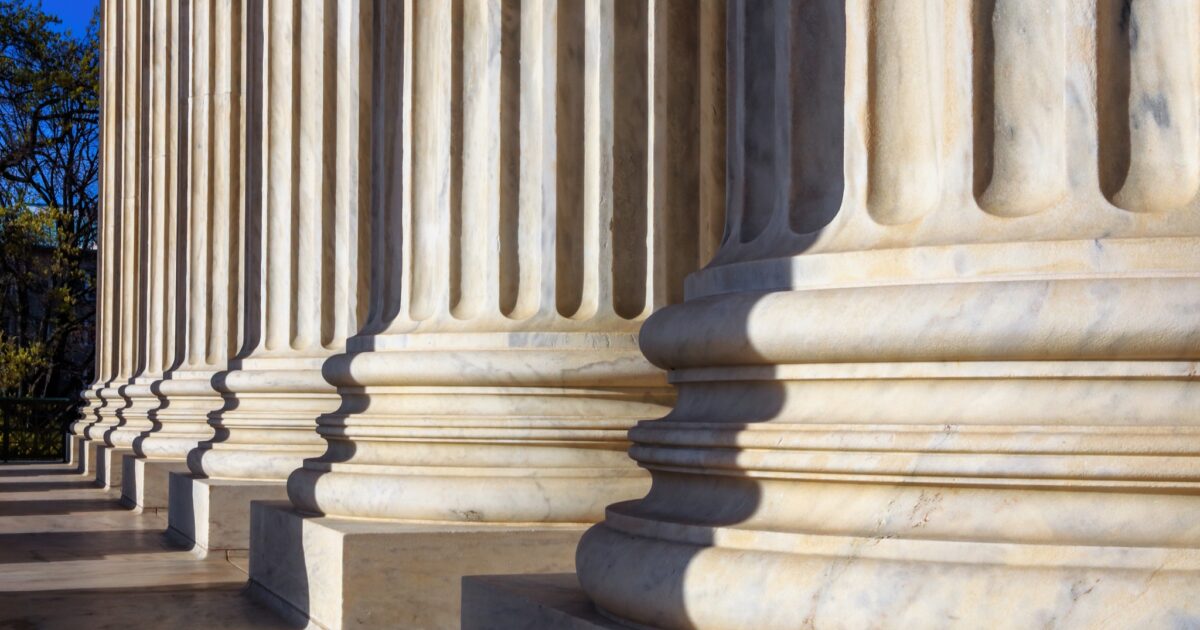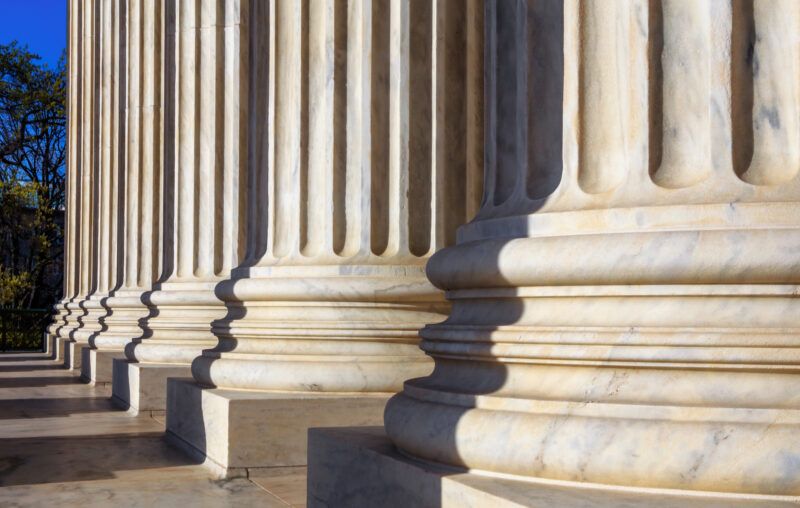Reprinted from Law & Liberty
“Don’t throw the baby out with the bathwater” is a saying that seems to go back to 1512. We use the saying to warn a friend against a syndrome of erring: In jettisoning something bad, first separate out the things that are good.
The hazard is especially great in the higher or deeper levels of thought and sentiment. All is fuzzy, and emotions impel us in ways little understood. When we feel in our heart something to be bad, we often have trouble delimiting that something. In our ire, we are vulnerable to summary expressions and caricatures. The pile is gathered imprecisely, too broadly. Sometimes we start down a road that leads to profound error. Precious things are forsaken.
Here we take up dual syndromes of bathwater-erring. Our words are addressed to friends on either side of the duality. One of us, Dan Klein, writes as a classical liberal open to conservative wisdom; the other, Dan Mahoney, writes as a conservative who appreciates that today the best of conservatism and classical liberalism stand or fall together.
On the one side, we have a portion of classical liberals—a term here used so as to subsume libertarians—who are unduly anti-religion, in the sense of being hostile to organized religions, to theism per se, or both. We speak of them as the anti-religionists, meaning specifically this non-left sort of anti-religion. They seem insufficiently mindful of the intimate connection between politicized atheism and the totalitarian negation of human beings.
On the other side, we have such figures as the “postliberal” gang of four, all Catholics and all associated with Catholic integralism, Patrick Deneen, Gladden Pappin, Chad Pecknold, and Adrian Vermeule, as well as others such as Yoram Hazony, who position themselves against something they call “liberalism.” We speak of them as the anti-liberals, meaning specifically this non-left, religiously oriented sort of anti-liberalism.
In each case, the group is beset by overgeneralizations and simplistic representations of that which it rejects. In each case, a baby is thrown out with the bathwater. But if the anti-religionists stopped throwing out the baby, the other group would be friendlier to the best currents of classical liberalism. And if the anti-liberals stopped throwing out the baby, the other group would be friendlier to religion. If one erred less, the impulse toward erring by the other would be less. They could better coalesce to common purpose and something truer.
In each case, there is foul bathwater to be disposed of. Organized religions, religious practice, and religious fervor have sometimes led to what Machiavelli in The Prince called “pious cruelty.” Religious groups can be fanatical or superstitious. But is religion necessarily so? Adam Smith spoke of certain sources as “almost the only causes which can occasion any very gross perversion of our natural sentiments.” Those sources were “[f]alse notions of religion.”
As for classical liberals, they can be dogmatic and rationalistic, with a self-defeating subjectivism, an aversion to the supremacy of the good of the whole, a lack of appreciation for custom, tradition, and authority, a defective anthropology, and a thin understanding of virtue. But is classical liberalism necessarily or automatically so? What of Josiah Tucker, Adam Smith, Edmund Burke, Alexis de Tocqueville, Lord Acton, C.S. Lewis, Michael Polanyi, Friedrich Hayek, and many others? Do they evince those sorry features? Are they not generally favorable to liberalization in public policy, with a posture against big government? And do they not reject scientism, radical subjectivism, and a philosophical materialism that leaves little place for the wellsprings of the human spirit? There is a conservative spirit in each of these thinkers, though they may embody it to differing degrees.
The Anti-Religionist Syndrome among Classical Liberals
Libertarians of the 1970s and 1980s, influenced especially by Murray Rothbard, were aware of “the three A’s”: Austrianism (as in Austrian economics), anarchism, and atheism. We are concerned with the last “A”, atheism. The late libertarian thinker George H. Smith wrote Atheism: The Case Against God (1974). The libertarian network was also influenced by Ludwig von Mises and Ayn Rand, both of whom may be deemed anti-religionists. Other influential figures, such Milton Friedman and Robert Nozick, and earlier figures such as Albert Jay Nock, Henry Hazlitt, and Frank Chodorov, were not vocally anti-religionist, but did little to counteract the errors of anti-religionism. H.L. Mencken lampooned most of what his fellow Americans believed in, including religion (e.g., Treatise on the Gods, 1930). Perhaps a majority of those in libertarian circles were irreligious, but many were not. At Liberty Fund and the Foundation of Economic Education (FEE), for example, many leaders were strongly motivated by religious inclinations or interests, at least originally. And some of the heroes of libertarianism, such as Frédéric Bastiat, mixed their theism with their liberal teachings.
But, then and since, religiosity has tended to be low-profile and has generally been taken to be separable from the ideas advanced. One cause of separation between libertarians and conservatives is their different postures toward religion. Conservatives are much more sensitive to the nature of totalitarian collectivism, in particular, its fanatical atheism, the jealous program to “murder God” in Eric Voegelin’s provocative phrase. Conservatives better understand that nature abhors a vacuum.
But anti-religionism among classical liberals goes back much further. In the 1770s, Adam Smith and others christened their political outlook “liberal,” but we might extend liberalism backward somewhat before 1770. Thus, we might also count the following as classical liberals who tended to have an animus against religion: Voltaire, Diderot, Condorcet, Thomas Paine, Thomas Jefferson, James Mill, Jeremy Bentham, and John Stuart Mill. Some would add John Locke to the list.
Throughout the western world, including Latin America, political parties associated with liberalism were often at odds with their country’s religious institutions, particularly the Catholic Church, even as Popes like Leo XIII accepted central liberal ideas in the fight against socialist and statist incursions. There is a cultish strain among some of the doyens of classical liberalism, as though liberalism vies with religion by offering a competing philosophy of life.
But the affirmation of freedom in and of itself says little about what human beings ought to do with their freedom. The philosophy of Burke and Tocqueville sees the human will, political and personal liberty, virtue, and the search for truth as essential parts of a whole. Classical liberalism, rightly enough, seeks a politics that vastly underdetermines things in human societies. But that policy outlook too often slips into what C.S. Lewis called “the poison of subjectivism” in a 1943 essay by that name. We suggest that an undue focus on freedom has given rise to an undue moral subjectivism (and modern indifference) on wider moral attitudes.
The same cannot be said for a liberalism open to traditional wisdom, or a conservatism that understands virtue’s connection to freedom. One example is the twentieth-century French political thinker Raymond Aron, a liberal open to conservative insights. In a posthumously published booklet, written in 1978, entitled Liberté et egalité, Aron suggested that every individual should be free, within broad limits, “to choose his path in life.” But, he explained, that ample place for free choice should not be confused with the false idea that each of us is relieved of pervasive moral duties and is free to choose his own “conception of good and evil.” A thin concern for virtue leads to the destruction of the framework of a political order of free and responsible human beings. It risks turning free men and women into god-lings of a delusive sect or racket of one kind or another. Burke, Constant, and Tocqueville all learned from the French Revolution that bad morals are the seedbed of bad politics.
What’s Wrong with Anti-Religionism?
Libertarians are not all Robespierres but among classical liberals there has been an anti-religionist strain. In what respects does this throw a baby out with the bathwater?
First of all, theism lays a foundation for healthy patterns of thought. We believe that ethical philosophizing is generally patterned after benevolent monotheism. Adam Smith’s ethical approach, if not theistic, is at least patterned after benevolent monotheism. The “impartial spectator,” in the highest sense of the term, is like God in important respects (if not all respects). Smith is explicit that the conscience, “the man within the breast,” is a “representative” of that universal beholder. Smith also endorses thinking along the lines of Imago Dei. When anti-religionists throw out theistic convictions about the origins of the universe and the afterlife, they sometimes also throw out certain patterns of sense-making associated with religion, like vital elements piled too carelessly with debris.
Many modern tenets have prompted the discarding of thinking with religious overtones, tenets like the positive-normative distinction, “methodological individualism,” and various demarcations which flatten “science” unduly, and sometimes even identify it with reductive scientism. The beholding of the spectacle of the whole is an aesthetic experience, and it is an experience that humans are not party to; our precision and accuracy are not only often phony, but they concern things that are merely particular aspects of that supreme experience.
Smith alerted us to an unhealthy tendency: The salutary doctrine of a life to come where justice would be rendered, he said, has often “been exposed to the derision of the scoffer” because the teachings of some of that doctrine’s “most zealous assertors” about “the distributions of rewards and punishments… in that world to come [have] been too frequently in direct opposition to all our moral sentiments” (TMS 132.33). After quoting some nonsensical assertions about rewards and punishments in the world to come, Smith says: “Can we wonder that so strange an application of this most respectable doctrine should sometimes have exposed it to contempt and derision; with those at least who had themselves, perhaps, no great taste or turn for the devout and contemplative virtues?”(134.35). Smith, in fact, never quite says that the doctrine is true. He says it is “respectable” and “venerable.” Indeed, we believe that, even for one who is not a theist, some notion of a timeless moral judging of one’s action, a ringing in eternity, is crucial to ethics. One who discards it stunts his devout and contemplative virtues.
Compared to non-theists, religious believers generally have a deeper appreciation of the depths of the soul, of the drama of good and evil in every human heart. They do so because they have become better naturalized to patterns of ethical thought that foster those virtues. Openness to religion can give greater depth of soul to liberalism. If they are not religious themselves, liberals should be anti-anti-theism. Anti-anti-theism helps to protect liberalism from jejune invocations of ‘utilitarianism’ and from an anti-spiritualism that can hardly uphold the dignity of the human person, the glory of Imago Dei.
The anti-religious posture also undercuts human thriving in more direct ways. Anti-religionists do not appreciate the extent to which human beings are religious creatures, or, at least, quasi-religious. Their dismissiveness toward religion reinforces that lack of appreciation.
We, in the modern world, are in many respects fish out of water. Some have said we live in a world “after virtue,” because we lack strong social cohesion with a common outlook about what serves the good of the whole and corresponds to virtue. But we must adapt virtue to modern circumstances. Lacking strong social cohesion, we must, each of us, seek coherence by finding meaning in higher things in life—things personally sacralized, things we take a just pride in and identify with, and ideas we not only believe but believe in.
Here, classical liberalism provides only rudimentary assistance. In the space of higher things, it merely cordons off—as off-limits—certain areas of that space. It says: Don’t sacralize the governmentalization of social affairs; don’t embrace a quasi-religion that spells anti-liberal politics. That is crucial, but it only wards one away from bad things; it does not point to things to sacralize. Professional classical liberals might have trouble appreciating this, because, as professionals, they sacralize liberal discourse, philosophizing, and social activities, and take pride in their own participation in them. They believe in that. A quasi-religion can offer meaning to its clerics even if it is thin. But to the laity, a thin quasi-religion is, well, thin. Religious traditions provide thicker resources and more practical guidance, while also emphasizing contact with the sacred, with the sublime, and with limits rooted in the nature of things.
People who learn religious patterns of thought often have less hubris about outsmarting the complexities of life. “I maintain my habit of speaking plainly, frankly, and openly, because that is how I must speak to God.” Children raised with religion become accustomed to habits of thought and sentiment as though there were a universal benevolent beholder who makes timeless judgments (though those judgments consider timely conditions).
In human instinct, there is a pull toward temporal-centric power as something to follow and believe in. Burke knew it, and Tocqueville knew it. Religion competes with such fatal quasi-religion. If classical liberals wish to combat it, they had best coordinate with others arrayed against that evil. In his Reflections on the Revolution in France, Burke warned modern rationalists that “man is by his constitution a religious animal.” And despite significant mistakes and deformations, the Christian religion has been “one great source of religion amongst us.” But to war on the West’s religious inheritance is to invite new forms of quasi-religion that are nothing but “uncouth, pernicious, and degrading superstition(s).” Our experience of totalitarian despotism and of those in Western societies who would, willy-nilly, pave the way for the same bears out Burke’s deep forebodings.
That is why the conservative liberal Tocqueville, who seemed to understand that man is now a fish out of water, could state with the firmest confidence in Democracy in America, “Despotism can do without faith, but freedom cannot… How could society fail to perish if, while the political bond is relaxed, the moral bond were not tightened? And what makes a people master of itself if it has not submitted to God?” But “the moral bond” is mainly about voluntary self-limitation informed by religion, not the coercive confessional state sometimes recommended by the integralists.
Before moving to the postliberal integralists, it should be noted that anti-religionism impoverishes one’s conceptual understanding of liberalism. Larry Siedentop writes of the moral intuitions established by Christianity, explaining that liberals should show due gratitude for the role of Christianity in making liberalism possible. Siedentop’s story starts in the ancient world, before Christianity. But jump to the so-called Renaissance and thereafter:
For centuries a privileged, monolithic church which was almost inseparable from an aristocratic society, confronted Europeans. So the church became associated in the popular mind with social hierarchy and deference, even at times with coercion, rather than with the moral equality and role of conscience.
Siedentop argues that Christendom was so immersed in the ontological intuitions of Christianity that people lost sight of their origins. They misunderstood the ancient world, in particular by not seeing the cult-like nature of the ancient family. Looking at but recent centuries, exulting vainly in their own worldview, figures often admired by classical liberals threw the Church, Christianity, or sometimes religion generally under the bus. Such erring is seen, perhaps, in Machiavelli, Montaigne, Voltaire, Diderot, Helvétius, d’Holbach, Condorcet, and Thomas Paine.
Siedentop says that Christianity was necessary but not sufficient for liberalism. Eastern Christianity did not produce liberalism, partly because the church was so submerged within or entangled with the temporal powers. Classical liberals could apply their healthy criticisms of governmentalization to see how liberal potentialities within the Christian revolution were realized in the West to a degree that elsewhere scarcely approached.
Abusing the Liberal Little Angel
Now we turn to the other baby abused. Compared to the great benevolent monotheisms, which started in the ancient world, the ‘baby’ we turn to now is, like Bach, Mozart, and Beethoven, ‘classical’ only within the modern period, as Constant said. This little angel is younger than Judaism, Christianity, or Islam.
If liberalism means what the integralists say it means, then one must be sympathetic to large parts of their critique. Yoram Hazony’s characterization of the liberal tradition is not entirely satisfactory, yet he remains a stalwart of constitutionalism in his recent book Conservatism: A Rediscovery. We sympathize with his criticisms of abstract rationalism but much prefer the mix of principle and prudence to be found in the conservative liberal traditions. And as Richard Reinsch has noted in his review of Hazony’s book, Hazony’s “historical empiricism” seems to depend on a sort of “biblical positivism” to do the work of practical reason. Hazony also rejects any appeal to “natural rights,” rather than tying them in a salutary way to older moral understandings that give the exercise of rights heft and balance. To be sure, Hazony’s “conservative democracy” provides some guidance for addressing our crisis. But conservative democracy is hardly conservative, prudent, or sober if it positions itself aggressively against the classical liberal tradition.
The integralists tend to create a ‘liberalism’ strawman. Sometimes they bundle, when they should separate, Smithian liberalism and the leftism that for more than a century has in certain quarters of the world passed itself off as ‘liberal.’ Contrary to various representations of the integralists, Hazony, and others, Smithian liberalism:
- is not rationalistic or axiomatic,
- is not favorable to radical autonomy,
- is not unappreciative of custom and tradition,
- is not wedded to social-contract theory,
- is not hostile to natural law or the notion of a moral order to the universe,
- is not of the view that every moral obligation stems from a social act of consent,
- is not anti-clerical,
- is not insouciant about virtue and blind to the exaltedness of higher things,
- is not unfaithful to the common good,
- is not reductionist and scientistic,
- is not at odds with patriotism nor even with a temperate, humane, practical sort of nationalism,
- is not inclined toward a fanciful, decontextualized liberty, abstracted away from real-world institutions,
- and is not unaware that liberty represents a duty as well as a right, as liberty depends, as Constant said, on civic virtue, on responsibilities fulfilled.
Understanding the distinction between voluntary and coercive behavior, a distinction rooted in our very constitution as organisms distinct from one another, Smithian liberalism understands that the governmentalization of social affairs is, by and large, destructive of cultural integrity and human vitality. Government itself is a reality to be coped with, and Smith wrote without irony of “the greatest and noblest of all characters, that of the reformer and legislator of a great state.” Smith’s liberal principles are presumptive only, and they would contour our best approach to sustaining virtue in modern circumstances. Those principles seek to sustain some basic social grammars, to keep the wild, spontaneous grove of social poetry relatively peaceful. Thomas Sowell always asks: Compared to what? Whatever it is that the integralists are proposing, how could it not give a central place to Smithian-liberal principles?
Those of us who try to preserve the best of classical liberalism are sometimes derided as “right liberals,” indifferent to the good and complicit in a subjectivist erosion of civilized liberty. But Burke, Tocqueville, Aron, and the co-authors of this article reject radical subjectivism and affirm a ‘God is watching’ duty to the good of the whole, just as much as the integralists do. Truth, goodness, and virtue are indeed correspondent. But in policy and politics, the integralists tussle with strawmen, and not, say, Burke’s orientation toward ‘practical liberty.’
Sohrab Ahmari is right to reaffirm the common good as a meaningful category of human and political life. But as Pope John Paul II reiterated, authentic religion aims to persuade, not coerce. It is striking how ambivalent the integralists are about religious liberty, a liberty defended as the first of our freedoms by the contemporary Catholic Church. “Common good constitutionalism” is by no means a contradiction in terms. The integralist version of the concept is vague and often evasive. It often seems more coercive than constitutionalist and forgets that in decisive respects virtue must be freely chosen. The integralist version of the concept lacks sufficient confidence in people, in their private affairs, to conduct themselves responsibly, or to learn to do so. By denying the possibility of a conservatism that includes the best liberal theory and practice, the integralists have largely left behind the conservatism that Americans rightly associate with Burke, Russell Kirk, William F. Buckley, George Will, and Thomas Sowell. Are Ahmari and the others ‘post-conservative’ as well as ‘post-liberal’? They give us ample reasons to think so.
The Spirit of Liberty and the Spirit of Religion
The integralists scorn fusionism. Our view, in line with Dan McLaughlin, is that a coherent fusionism will indeed be suitable to many conservative liberals, and more vital still is coalitionism.
There is an imprudence in forgetting that liberal principles, suitably cherished, are a check on power, the levers of which are, one day to the next, to be controlled by the good’s worst enemies. Subverting the liberal backbone of Western civilization invites Tocqueville’s dystopias.
Humans are imperfect, and each of us is bound to produce some dirty bathwater. Dirt is to be thrown out, but it must be separated from the health and wholeness that we love. Tocqueville proposed that the “spirit of liberty” (l’esprit de liberté) and “the spirit of religion” stand or fall together. In throwing out the dirt in a baby’s bathtub, take care not to throw out the baby itself. Tocqueville was right: When either baby is thrown out, the other perishes as well.
Bereft of the spirit of liberty and the spirit of religion, the organic core of society is hollowed out. The void is filled with what Tocqueville tried to warn us against: tutelary despotism followed by massive degradation of the human spirit and slavery to lawless government. Mordor prevails if its adversaries do not coalesce.





